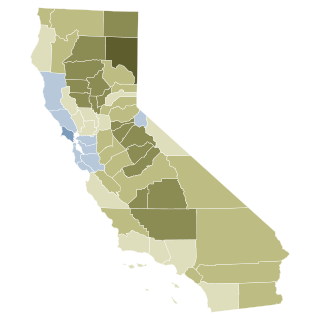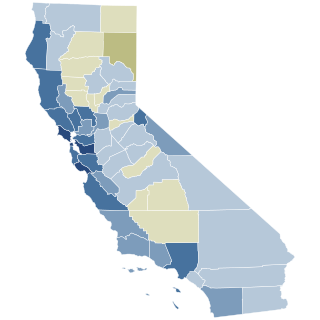The California Voter Bill of Rights is an adaptation of the United States Voting Rights Act passed in 1965.

The League of Women Voters (LWV) is a nonprofit, nonpartisan political organization in the United States. Founded in 1920, its ongoing major activities include registering voters, providing voter information, and advocating for voting rights. In addition, the LWV works with partners that share its positions and supports a variety of progressive public policy positions, including campaign finance reform, women's rights, health care reform, gun control and LGBT+ rights.

California Proposition 187 was a 1994 ballot initiative to establish a state-run citizenship screening system and prohibit illegal immigrants from using non-emergency health care, public education, and other services in the State of California. Voters passed the proposed law at a referendum on November 8, 1994. The law was challenged in a legal suit the day after its passage, and found unconstitutional by a federal district court on November 11. In 1999, Governor Gray Davis halted state appeals of this ruling.
This is a list of notable events in the history of LGBT rights that took place in the year 2005.

The Constitution of California is the primary organizing law for the U.S. state of California, describing the duties, powers, structures and functions of the government of California. California's constitution was drafted in both English and Spanish by American pioneers, European settlers, and Californios and adopted at the 1849 Constitutional Convention of Monterey, following the American Conquest of California and the Mexican–American War and in advance of California's Admission to the Union in 1850. The constitution was amended and ratified on 7 May 1879, following the Sacramento Convention of 1878–79.

Proposition 74 (2005) was a ballot proposition in the 2005 California special election that intended to extend probationary periods for the state's public school teachers from two years to five before attaining tenure. It failed at the polls, with 55% of voters rejecting it.
California Democratic Party v. Jones, 530 U.S. 567 (2000), was a case in which the United States Supreme Court held that California's blanket primary violates a political party's First Amendment freedom of association.

California Proposition 87 was a proposition on the ballot for California voters for the November 7, 2006 general election, officially titled Alternative Energy. Research, Production, Incentives. Tax on California Oil Producers. It was rejected by the voters, 54.7% opposed to 45.3% in favor. This was highest-funded campaign on any state ballot and surpassing every campaign in the country in spending except the presidential contest.
The right of non-citizens to vote in the United States has historically been a contentious issue. Since 1997, the Illegal Immigration Reform and Immigrant Responsibility Act of 1996 has prohibited non-citizens from voting in federal elections, with the threat of fines, imprisonment, inadmissibility and deportation. Exempt from punishment is any noncitizen who, at the time of voting, had two natural or adoptive U.S. citizen parents, who began permanently living in the United States before turning 16 years old, and who reasonably believed that they were a citizen of the United States. At one point or another before 1926 40 states had non-citizens voting in elections. While federal law does not prohibit noncitizens from voting in state or local elections, no state has allowed noncitizens to vote in statewide elections since Arkansas became the last state to outlaw noncitizen voting in state elections in 1926. As of December 2022, at least thirteen local jurisdictions allow non-citizen voting, namely Winooski and Montpelier in Vermont, and eleven in Maryland near Washington, D.C. In 2023, D.C. itself started allowing local non-citizen voting. Additionally, the U.S. territories of American Samoa and the Northern Mariana Islands allow non-citizen US nationals to vote, a status granted to all persons born in American Samoa. All persons born in the Northern Mariana Islands automatically become US citizens at birth, as opposed to becoming US nationals at birth. Guam and Hawaiʻi, by contrast do not allow non-citizen US nationals to vote.

Amendment 46, also known as the Colorado Civil Rights Initiative, was a proposed initiative on the Colorado ballot for 2008. If ratified, Article II of the Colorado Constitution would have stated:
The State shall not discriminate against, or grant preferential treatment to, any individual or group on the basis of race, sex, color, ethnicity, or national origin in the operation of public employment, public education, or public contracting.

Proposition 8, a law enacted by California voters on 8 June 1982 by the initiative process, restricted the rights of convicts and those suspected of crimes and extended the rights of victims. To do so, it amended the California Constitution and ordinary statutes.
Marsy's Law, the California Victims' Bill of Rights Act of 2008, enacted by voters as Proposition 9 through the initiative process in the November 2008 general election, is an amendment to the state's constitution and certain penal code sections. The act protects and expands the legal rights of victims of crime to include 17 rights in the judicial process, including the right to legal standing, protection from the defendant, notification of all court proceedings, and restitution, as well as granting parole boards far greater powers to deny inmates parole. Critics allege that the law unconstitutionally restricts defendant's rights by allowing prosecutors to withhold exculpatory evidence under certain circumstances, and harms victims by restricting their rights to discovery, depositions, and interviews. Passage of this law in California led to the passage of similar laws in Florida, Georgia, Illinois, Kentucky, Nevada, North Carolina, Oklahoma, Ohio and Wisconsin, and efforts to pass similar laws in Hawaii, Iowa, Montana, Idaho, South Dakota, and Pennsylvania. In November 2017, Marsy's Law was found to be unconstitutional and void in its entirety by the Supreme Court of Montana for violating that state's procedure for amending the Montana Constitution. The Pennsylvania Supreme Court reached the same conclusion as Montana under its own state constitution in 2021.
A bill of rights, or the Bill of Rights, is a declaration of the rights that a citizenry have.
The School Success and Opportunity Act, is a California state law which extends gender identity and gender expression discrimination protection to transgender and gender-nonconforming K-12 students in public schools.

Marsy's Law for Illinois, formally called the Illinois Crime Victims' Bill of Rights, amended the 1993 Rights of Crime Victims and Witnesses Act by establishing additional protections for crime victims and their families. Voters approved the measure as a constitutional amendment on November 4, 2014. It became law in 2015.

A constitutional referendum was held in Zambia on 11 August 2016 alongside general elections, a move designed to reduce the cost of the referendum. Voters were asked whether they approve of proposed amendments to the bill of rights and Article 79, which dictates the process of future amendments.

The California state elections in 2020 were held on Tuesday, November 3, 2020. Unlike previous election cycles, the primary elections were held on Super Tuesday, March 3, 2020.

Rick Chavez Zbur is an American attorney currently serving in the California State Assembly.

The 2020 California Proposition 17 is a ballot measure that appeared on the ballot in the 2020 California elections on November 3. Prop 17 amended the Constitution of California to allow people who are on parole to vote. Due to the passage of this proposition, more than 50,000 people in California who are currently on parole and have completed their prison sentence are now eligible to vote and to run for public office. This proposition also provides that all those on parole in the future will be allowed to vote and run for public office as well. The work of Proposition 17 comes out of a history of addressing felony disenfranchisement in the United States. California voters approved this measured by a margin of roughly 18 percentage points.

Proposition 25, officially the Referendum to Overturn a 2018 Law That Replaced Money Bail System with A System Based on Public Safety Risk, is a California ballot proposition that appeared on the ballot for the general election on November 3, 2020. The "no" side prevailed, resulting in retention of the system of cash bail in the state.

Proposition 1, titled Constitutional Right to Reproductive Freedom and initially known as Senate Constitutional Amendment 10 (SCA 10), was a California ballot proposition and state constitutional amendment that was voted on in the 2022 general election on November 8. Passing with more than two-thirds of the vote, the proposition amended the Constitution of California to explicitly grant the right to an abortion and contraceptives, making California among the first states in the nation to codify the right. The decision to propose the codification of abortion rights in the state constitution was precipitated in May 2022 by Politico's publishing of a leaked draft opinion showing the United States Supreme Court overturning Roe v. Wade and Planned Parenthood v. Casey in Dobbs v. Jackson Women's Health Organization. The decision reversed judicial precedent that previously held that the United States constitution protected the right to an abortion.